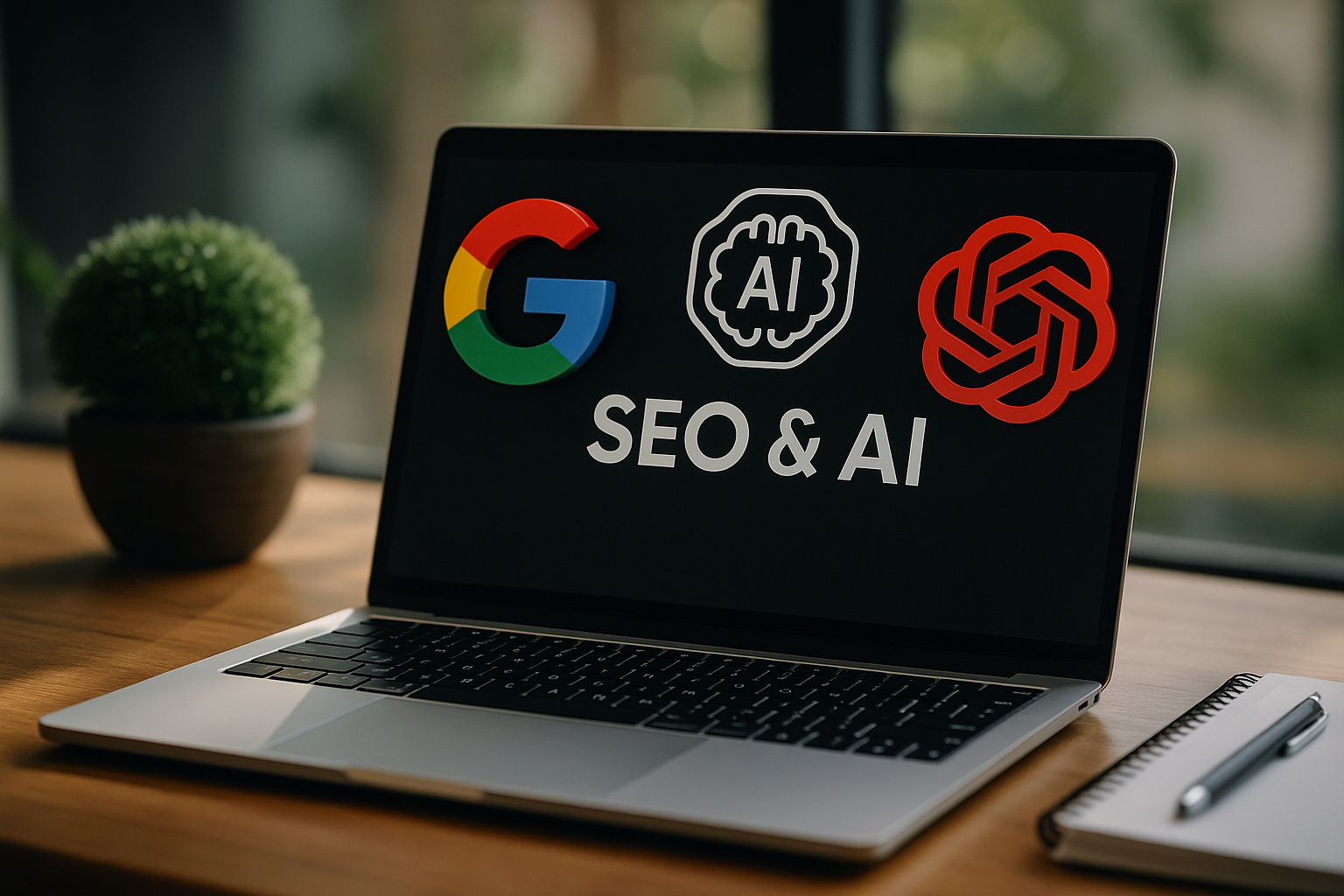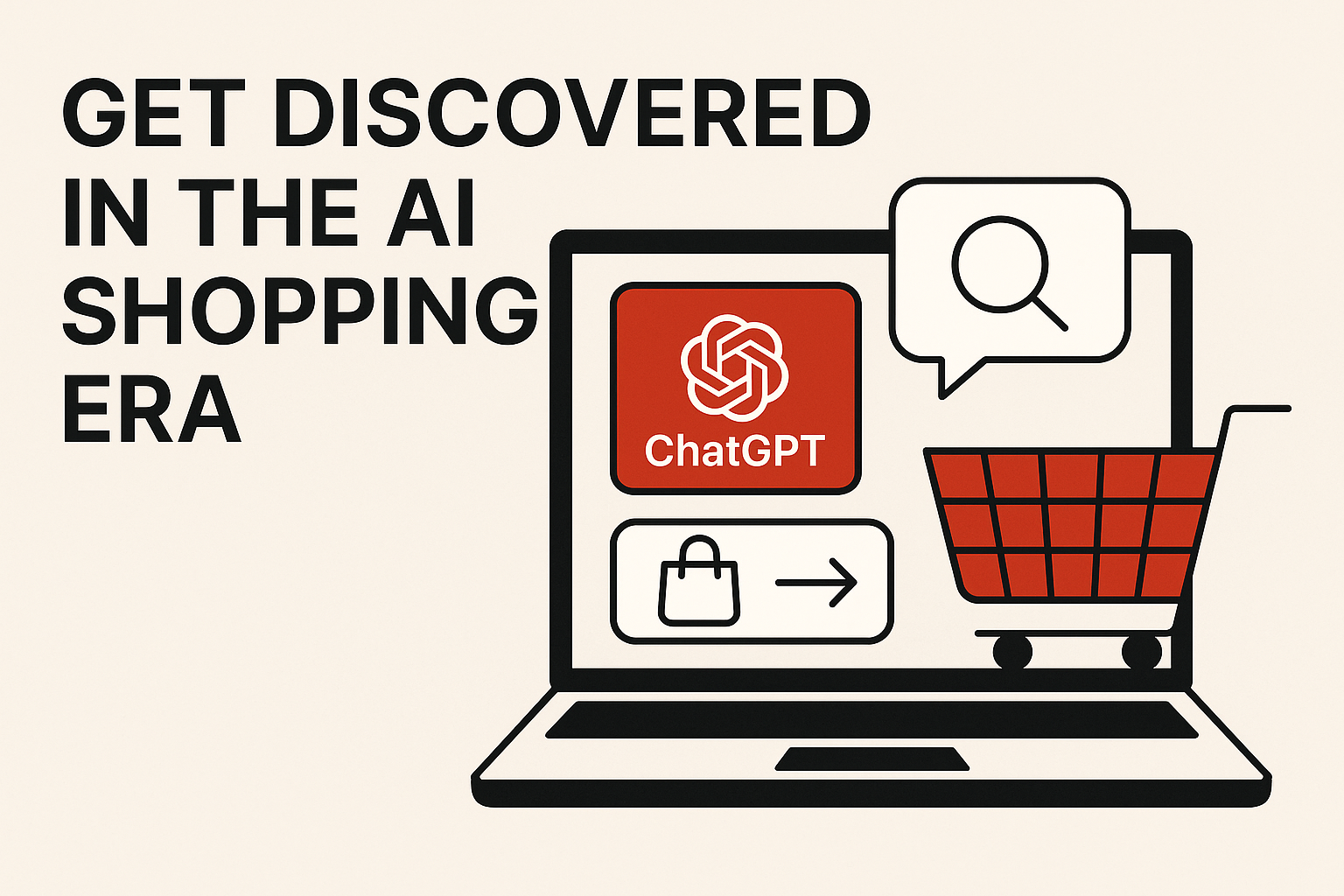Table of Contents
ToggleA Moment of Transformation: When Everything Changed
The moment my client said, “I found you on ChatGPT,” I knew the word of SEO had changed forever.
According to recent studies, over 50% of younger generations now use AI tools like ChatGPT and virtual assistants as their primary method of finding information.
This marks a major shift from traditional search engine reliance.
Search engine rankings are no longer the holy grail of business visibility. We’ve entered a new era – one where artificial intelligence has become the most intelligent gatekeeper of information.
As AI tools become more sophisticated, their ability to generate content at scale, analyze user intent, and predict search trends will further reshape SEO.
The rise of zero click searching and Google summarization feature completely redefined the way we do SEO.
In this article, I attempt to address all of the key questions you may have about SEO in the age of AI.
Is SEO really dead?
SEO isn’t dead – it’s transforming.
As Neil Patel pointed out in his recent analysis, Google still drives 63.41% of web traffic, but the ways people find information are changing dramatically.
We’re moving from traditional search engine optimization to what I call “search everywhere optimization”. This means your content must be great everywhere, not just optimized for Google..
In the past, SEO was all about using certain keywords and tricks to get your website to the top of Google’s search results.
But with the rise of AI, like ChatGPT, SEO is evolving.
Now, it’s not just about ranking high in search engines like Google. It’s about being discoverable across different platforms and tools, including AI-driven systems.
AI tools, like ChatGPT, change how people find information by providing quick, direct answers based on past data, not real-time web searches.
So while traditional SEO still plays a role, it’s now more important to focus on creating high-quality, trustworthy content that can be picked up by AI tools.
The New SEO Rules
Traditional SEO was focused on technical tricks – keywords, backlinks, and algorithmic hacks.
AI in Search is not that new. The first introduction of AI results dates back to 2015 with inclusion of RankBrain in the results. In 2018 BERT introduction improved natural language understanding. These systems analyzed relationships between words, prioritizing context over rigid keyword matching.
For example, BERT can understand prepositions and distinguish the difference between “with” and “without” in the user search. So Google will return different results for users searching for “how to bake with chocolate” vs. “how to bake without chocolate”.
In 2024 AI was dominating multiple areas of content creation, SERP optimization, semantic SEO and more.
We are seeing AI taking a more strategic role in 2025 with suggestion for specific keywords. Now it is even acting as a Shopping Assistant recommending products within answers (learn how to get ranked in the ChatGPT recommendations here)
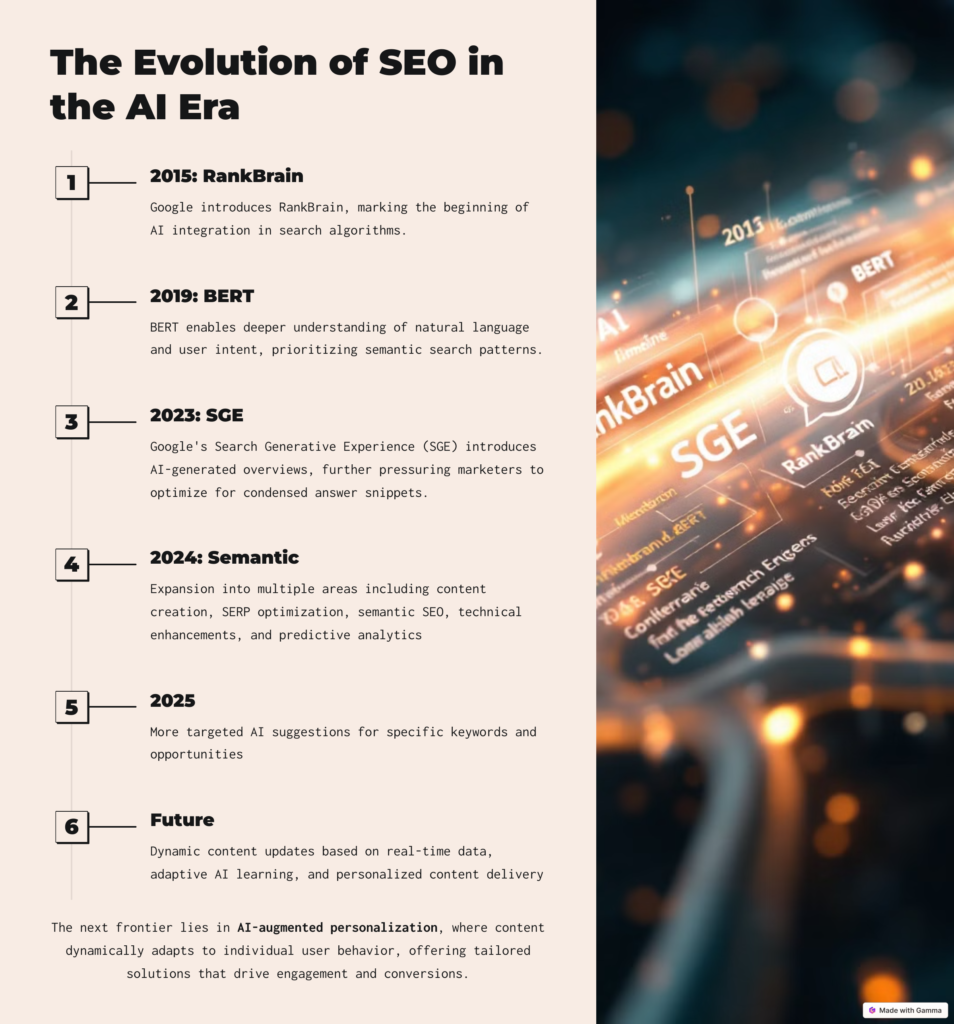
The new SEO rules are all about creating authentic, helpful content.
You can still use traditional SEO practices to improve visibility, but the focus is shifting.
Traditional SEO techniques like keyword optimization and ensuring your website is mobile-friendly are still important for general search visibility. However, for ChatGPT, the emphasis is more on quality content and authority.
Here’s how traditional SEO can help:
Keywords: Even though ChatGPT values context and user intent, including relevant keywords in your content can help make it discoverable by AI tools.
Technical SEO: Make sure your website is technically optimized (fast loading speed, mobile-friendly design, structured data) as ChatGPT will rely on that when pulling in information.
Content quality: The traditional SEO emphasis on creating useful, high-quality content is now more important than ever, especially for platforms like ChatGPT that value clarity and helpfulness.
With AI becoming more powerful, like in ChatGPT, the focus has shifted from just using keywords to creating content that truly solves problems. Start integrating these strategies:
User intent is key: It’s not just about keywords. Understand what users are really looking for and create content that provides clear answers.
Quality over quantity: AI tools like ChatGPT reward content that’s well-researched, clear, and authoritative. A few well-written, helpful articles are better than lots of thin, keyword-stuffed ones.
Storytelling matters: In addition to technical optimization (like having the right keywords and structure), AI tools love content that tells a story and connects emotionally with readers.
Transparency and trust: Content needs to be credible. Avoid using jargon and be honest about your sources and the expertise behind your content.
The goal is to shift from “SEO tricks” to providing real value through well-crafted, user-focused content
How does ChatGPT rank websites and determine authority?
ChatGPT and Google work very differently when it comes to ranking content. While Google is a search engine that ranks websites based on various technical and content-related factors, ChatGPT is an AI tool that provides answers by drawing on a vast knowledge base, rather than directly ranking websites.
Google: Google ranks websites by crawling and indexing pages, analyzing technical elements like keywords, backlinks, page speed, and mobile-friendliness. It uses complex algorithms to decide which websites should appear in the search results.
ChatGPT: ChatGPT doesn’t rank websites but curates content from its training data, selecting answers based on relevance, authority, and the quality of the information. It doesn’t perform real-time searches but uses the data it’s been trained on, making ranking less about SEO tricks and more about providing valuable, trustworthy information.
The biggest difference is that Google focuses on visibility through rankings, while ChatGPT focuses on delivering quality, relevant answers based on its internal knowledge base
When you ask ChatGPT a question, it generates responses based on the data it has been trained on. It determines authority based on:
- Quality content: ChatGPT looks for content that’s well-researched and provides actionable insights. The more authoritative the content, the more likely it is to be included in the responses.
- Reputable mentions: If a website is frequently referenced in respected publications or industry leaders, it signals that the site is authoritative.
- Consistency and relevance: Websites that consistently provide high-quality, relevant content over time tend to be valued more by ChatGPT.
While Google SEO was about technical optimization and keyword manipulation, ChatGPT rewards genuine expertise, clear communication, and problem-solving.
Authority in ChatGPT is about the overall reputation of the content, not just ranking on search engines.
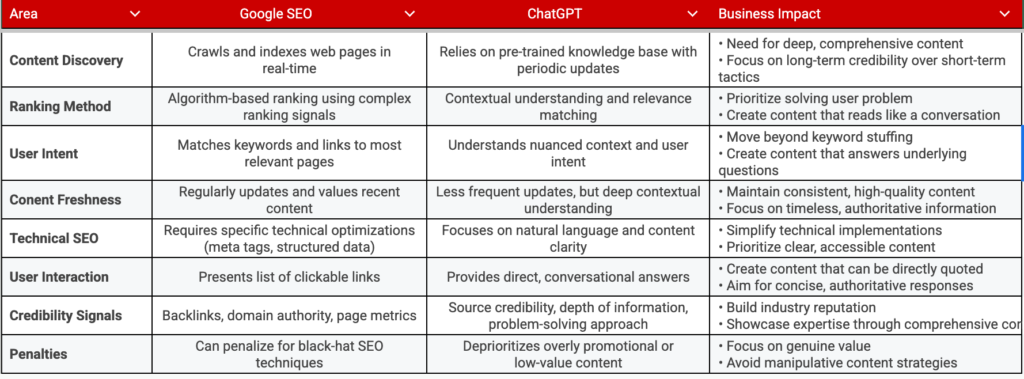
How can I rank high on ChatGPT search results?
Not all information is created equal in ChatGPT’s world.
Think of ChatGPT as a highly knowledgeable librarian who curates insights based on vast resources. Unlike traditional search engines that prioritize crawling, indexing, and ranking, AI-driven platforms rely on a curated, pre-trained knowledge base to deliver high-quality answers.
While AI can help with creating content faster and more efficiently, there are some important things to consider:
Quality matters: Google and AI platforms like ChatGPT both prioritize high-quality, well-researched content. AI-generated content should still meet these standards. If the content is vague, lacks nuance, or doesn’t add value, it might hurt your rankings.
E-E-A-T compliance: AI-generated content needs to follow the E-E-A-T guidelines (Expertise, Experience, Authoritativeness, Trustworthiness). AI can’t replace human expertise, so it’s important to ensure that AI-generated content is reviewed by experts to ensure accuracy and authority.
Overuse of AI: Relying too much on AI can lead to generic content that doesn’t resonate with readers. Mixing AI-generated content with human creativity and expertise can produce better results.
To rank high on ChatGPT, it’s important to focus on content that is both informative and trustworthy. ChatGPT doesn’t rank websites like Google does, but it curates information from its vast knowledge base.
So, to get noticed by ChatGPT, your content needs to be clear, authoritative, and solve real problems.
Why is E-E-A-T Important for SEO and AI?
E-E-A-T stands for Experience, Expertise, Authoritativeness, and Trustworthiness, and it’s a concept used by Google to evaluate the quality of content on websites.
These factors are essential for ranking well in search results, but they’re also highly relevant for AI tools like ChatGPT, which value the same qualities when determining which content to feature.
E-E-A-T is critical for both traditional SEO (like ranking on Google) and AI tools like ChatGPT because they help determine if your content is reliable and useful.
AI platforms don’t “rank” websites like Google, but they still curate and recommend content based on the same principles of credibility. Content that shows expertise, authority, and trustworthiness is more likely to be used as a source for AI-generated responses.
For example, ChatGPT might recommend content from a well-established, reputable website when answering a question. If your content reflects high E-E-A-T, it will stand out to both AI tools and users. In the era of AI-powered search and content discovery, E-E-A-T is more important than ever for ensuring visibility, trust, and engagement.
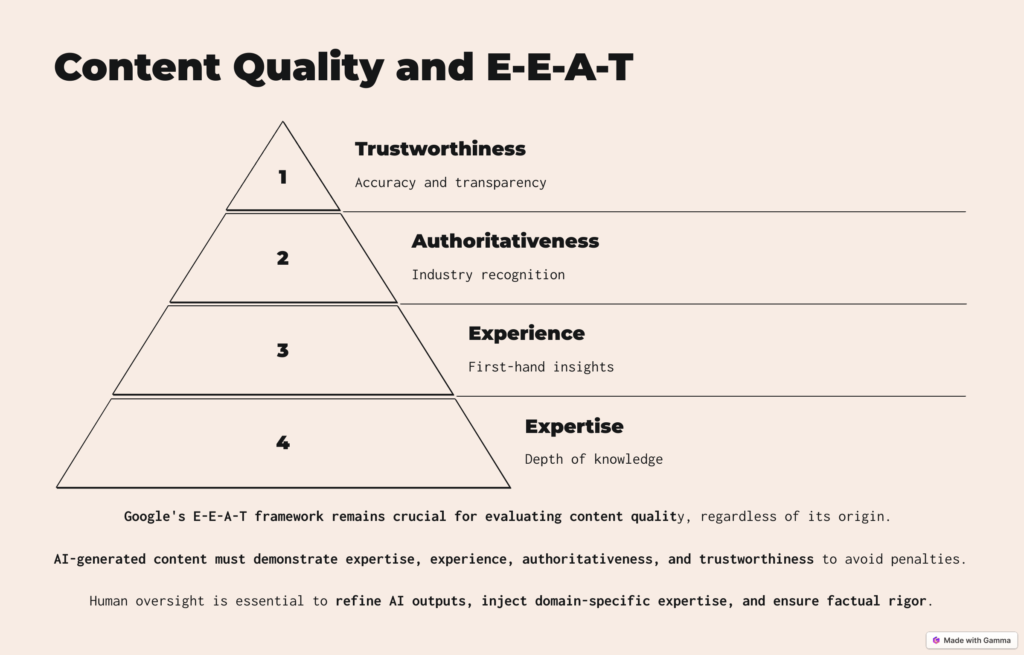
Let’s break down each part of E-E-A-T:
1 – Experience
This is the newest addition to E-A-T (Expertise, Authoritativeness, Trustworthiness). Experience refers to the real-world experience behind the content. It’s about showing that you or your content creators have hands-on, firsthand experience in the topic you’re covering. Here’s how it works:
Why it matters: Content that comes from personal experience is seen as more authentic and useful. For example, a blog post about how to fix a car would be more credible if it’s written by someone who has actually worked as a mechanic.
How to show it: Including personal stories, case studies, or examples of your own experience can demonstrate this aspect. It’s about showing that the author knows the subject matter from practical experience.
2 – Expertise
Expertise is all about the level of knowledge and skill the content creator has in the topic. Google and AI tools like ChatGPT look for content that comes from experts in the field, as it tends to provide more accurate and valuable information.
Why it matters: If your website talks about medical issues or financial advice, it’s crucial that the person creating the content is knowledgeable in those areas, preferably with formal qualifications or professional experience.
How to show it: Displaying certifications, degrees, or professional credentials in the content or on the website helps signal expertise. You can also showcase interviews, guest posts, or citations from other experts to strengthen your authority.
3 -Authoritativeness
Authoritativeness is about the reputation of the website or author. If a website is well-known and trusted in its industry, it is considered authoritative. ChatGPT and Google want to ensure that the information you’re providing comes from sources that people recognize as credible.
Why it matters: If your website has a lot of backlinks from trusted, reputable sites, it helps establish your authority. Likewise, being cited by respected sources (like academic journals or large news outlets) boosts your authority.
How to show it: Build backlinks from respected sites, get mentioned by credible media outlets, and contribute guest posts to authoritative blogs. The more recognized you are as an authority in your field, the higher the chance you’ll be seen as trustworthy by both search engines and AI tools.
4 – Trustworthiness
Trustworthiness is key to ensuring that users can rely on your content. It means providing accurate, honest, and well-researched information. Google and AI systems prioritize content that users can trust, especially in sensitive areas like health, finance, and law (often referred to as YMYL—Your Money, Your Life—topics).
Why it matters: Users need to trust the content they’re reading, especially if it involves sensitive issues. Misleading or inaccurate content can harm your reputation and SEO rankings.
How to show it: Make sure your content is fact-checked and reliable. Use citations from trusted sources, be transparent about your processes, and ensure that your site has secure browsing (HTTPS). If you’re writing about a specific field, it’s important to disclose conflicts of interest and be transparent about any partnerships or sponsorships.
How to Improve E-E-A-T:
Be transparent: Share your credentials and qualifications, particularly when writing on specialized topics.
Offer high-quality, well-researched content: Don’t just cover topics—dive deep and provide value. Use facts, case studies, and data to back up your claims.
Build a strong online reputation: Get mentioned by trustworthy websites, engage with your audience, and maintain positive reviews.
Ensure security: Make sure your website is secure (HTTPS) and user-friendly.
How important is keyword research and on-page SEO in the AI era?
Keyword research and on-page SEO are still important, but the focus has shifted slightly in the AI era.
While AI tools like ChatGPT don’t rank websites by traditional SEO methods, keyword research can still help make your content more discoverable and relevant. Here’s why:
Keyword research: It helps you understand what people are searching for and the language they use. Using the right keywords ensures that your content aligns with what users are asking, which is important for both AI-driven platforms and traditional search engines.
On-page SEO: Even though AI focuses on content quality and user intent, on-page SEO (like proper use of headings, meta descriptions, and internal links) helps ensure that your content is easily accessible and understandable. It can also help optimize for voice search, which is becoming more common in the AI era.
Studies indicate that while AI can mimic human tone and structure, it often lacks the contextual nuance and original research that distinguish high-quality content.
For example, MIT research found that readers preferred AI-generated content for clarity but criticized its tendency to generalize complex topics. This underscores the need for human oversight to refine AI outputs, inject domain-specific expertise, and ensure fact-checking.
AI excels at large-scale keyword analysis, identifying long-tail opportunities and semantic variations invisible to manual methods.
Tools like MarketMuse and Frase use machine learning to map content gaps and recommend topic clusters aligned with user intent. However, over-reliance on AI for keyword stuffing undermines readability and violates Google’s Quality Rater Guidelines, which penalize “content written primarily for search engines rather than people.
A balanced keyword research approach involves using AI to generate keyword hypotheses while human editors validate relevance.
For instance, AI might suggest targeting “best AI SEO tools 2025,” but editors must assess whether the phrase aligns with the brand’s offerings and audience needs.
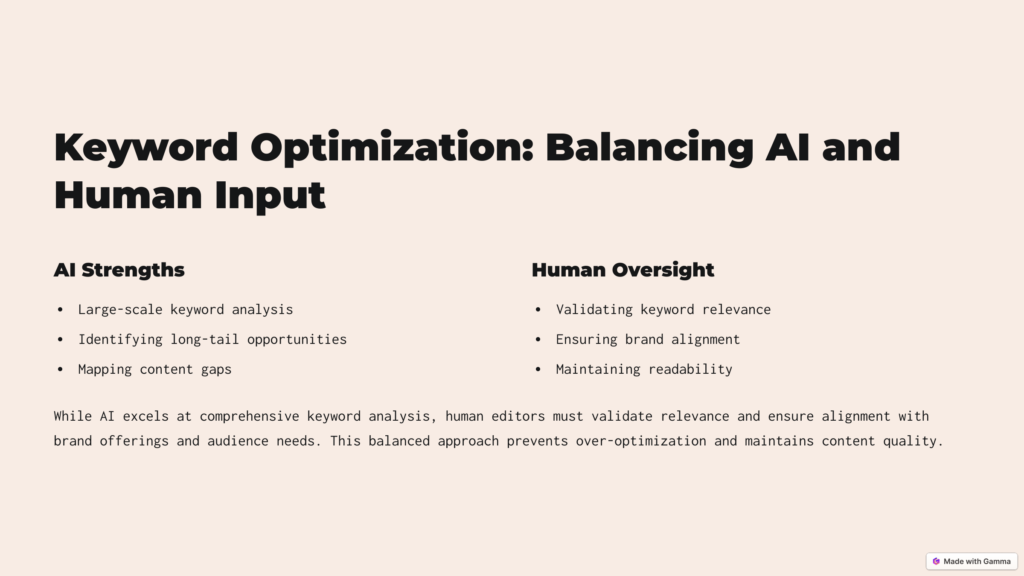
In short, keyword research and on-page SEO remain important to ensure that your content is aligned with search patterns and easy for AI tools to understand, but humans continue to play a key role in final keyword selection.
Best Practices for AI-Generated Content in SEO
Artificial intelligence is a powerful tool that’s reshaping how we approach SEO.
But while AI can do some incredible things, it’s not a magic fix for every SEO challenge. To truly get the best results, it’s important to combine AI’s capabilities with human expertise.
The best practices here focus on how to use AI in a way that enhances your SEO strategy, without losing the personal touch and quality that both search engines and readers love.
1- Hybrid Content Creation
Modern AI tools like Clearscope and SurferSEO analyze top-ranking content to identify entity relationships (e.g., “AI content” linked to “Google guidelines” and “E-E-A-T”). Optimizing for these connections helps search engines contextualize content, improving rankings for related subtopics.
2- Rigorous Quality Assurance and Fact Checking
AI-driven platforms like Transifex enable automated translation while preserving SEO metadata (e.g., hreflang tags).
However, localization goes beyond language—cultural nuances, regional search trends, and local backlink profiles require human strategists to adapt AI outputs.
Google mandates disclosing AI involvement when content could mislead users about its origins, particularly in YMYL (Your Money Your Life) niches like finance or health.
Adding a disclaimer (e.g., “This article was created with AI assistance and reviewed by our editorial team”) builds trust and complies with evolving regulations.
3 – Technical SEO Enhancements
Through AI AI tools like BrightEdge and SE Ranking analyze page speed, mobile-friendliness, and schema markup at scale. For example, AI can recommend image compression settings to reduce load times or generate JSON-LD schemas for product pages.
4 – Predictive Analytics for Trend Targeting
Machine learning models forecast seasonal search trends and emerging keywords. HubSpot’s AI Content Writer, for instance, predicts traffic potential for topics like “AI SEO trends 2026” six months in advance, allowing teams to align content calendars with anticipated demand.
5 – Voice Search and Conversational AI
With 65% of 25-34-year-olds using voice search daily, optimizing for natural language queries is critical. AI tools like AnswerThePublic analyze voice search patterns to generate question-based content, such as “Can AI-written content rank on Google?”
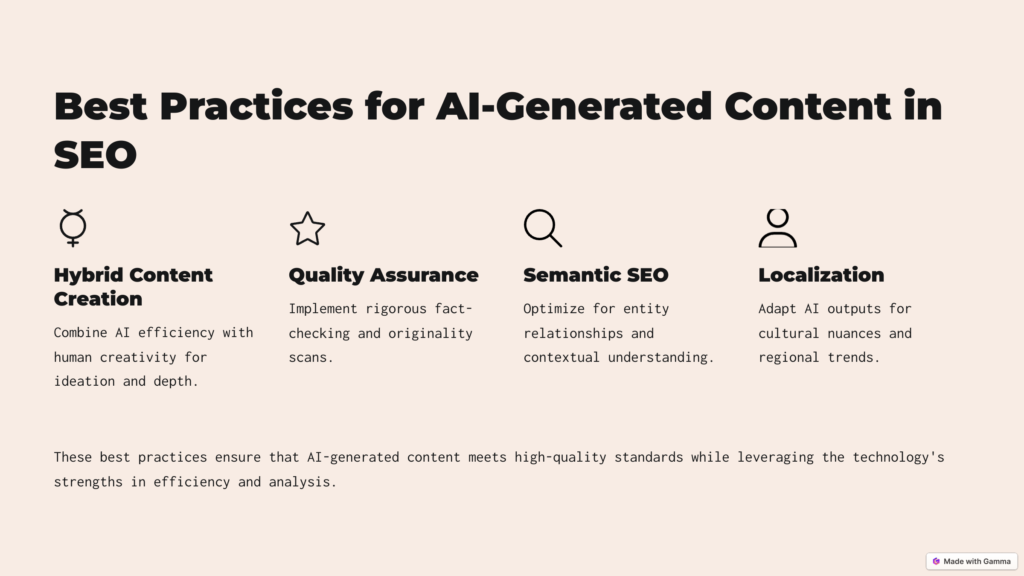
How to Create a Strong ChatGPT Ranking Strategy
1. The Language of Trust
Forget corporate jargon and technical mumbo-jumbo. ChatGPT responds to content that sounds human—content that feels like a conversation over coffee with a trusted advisor.
Consider the difference:
- Corporate Speak: “Our proprietary solution leverages cutting-edge algorithmic paradigms to optimize enterprise workflow integration.”
- Human Speak: “We built a tool that helps teams work together more easily and save time on everyday tasks.”
The second approach doesn’t just communicate—it connects. It solves real problems in language people actually use.
2. Building Digital Credibility
Credibility in the AI era is multifaceted.
It’s not about how loudly you can shout about your achievements, but how consistently you can demonstrate genuine expertise.
The Credibility Checklist
- Certifications: Don’t just list them—explain their significance
- Case Studies: Move beyond bland statistics to storytelling
- Industry Engagement: Participate in conversations, not just broadcasts
- Consistent Quality: Regular, meaningful content that genuinely helps
3. Technical Foundations
While content is king, the technical infrastructure of your digital presence is the kingdom’s foundation.
Think of your website as a complex ecosystem that AI must navigate:
- Structured data that clearly communicates your expertise
- Mobile-responsive design that works seamlessly across devices
- Clear, accessible content that AI can easily parse and understand
Navigating the Potential Pitfalls
Beware the digital landmines that can derail your AI visibility:
- Jargon Trap: Complex language isn’t intelligence; it’s confusion
- Stale Content Syndrome: Your digital presence must evolve continuously
- Mobile Neglect: Assume many interactions happen on smaller screens
- Unsubstantiated Claims: Every bold statement needs concrete evidence
Future of SEO: Technical Enhancements Through AI
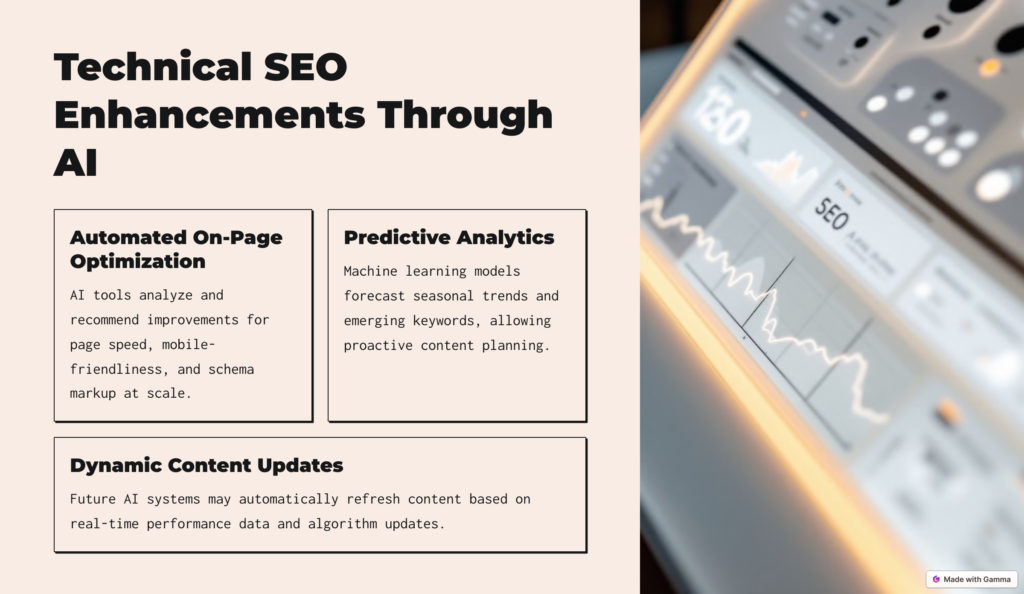
Technical SEO plays a crucial role in determining how well a website performs in search rankings. As AI continues to shape SEO strategies, technical enhancements are becoming more sophisticated, efficient, and automated.
1 – Automated On-Page Optimization
AI is transforming the way we approach on-page optimization, automating tasks that traditionally required manual effort. AI tools now analyze various factors on your website and make recommendations to enhance the technical aspects of your pages.
This includes improving page speed, ensuring mobile-friendliness, and refining schema markup at scale.
Why It Matters:
Page Speed: Fast-loading pages are crucial for user experience and SEO rankings. Slow websites lead to high bounce rates, which can hurt your rankings.
Mobile-Friendliness: With more than half of all web traffic coming from mobile devices, ensuring your website is mobile-responsive is essential for maintaining visibility in search results.
Schema Markup: AI tools help optimize schema markup, making it easier for search engines to understand your content and present it in rich snippets, which can boost visibility.
AI is capable of making these improvements automatically, saving businesses time and resources while ensuring that technical SEO issues are quickly addressed and optimized.
2 – Predictive Analytics for Content Strategy
AI doesn’t just help optimize existing content—it can also help predict what content will perform well in the future.
With predictive analytics, machine learning models forecast seasonal trends and identify emerging keywords that will likely drive traffic. This proactive approach allows businesses to align their content calendars with what users are actively searching for, even months ahead of time.
Why It Matters:
Anticipating Trends: With AI tools analyzing vast amounts of data, you can be ahead of the competition by producing content based on trends before they peak.
Keyword Optimization: Predictive analytics ensures that your content targets keywords that will be highly relevant to your audience in the future, helping you stay visible and competitive.
AI-driven predictive tools can give your SEO strategy the foresight needed to plan and execute content that aligns perfectly with user intent.
3 – Dynamic Content Updates
One of the most exciting aspects of AI in SEO is the potential for dynamic content updates. AI systems in the future may be able to refresh content in real time based on performance data and algorithm updates. This means that your content could automatically adjust to incorporate the latest SEO trends, updated keywords, and even current events—keeping it fresh and relevant without you lifting a finger.
Why It Matters:
Automatic Adjustments: By continually updating content in response to algorithm changes or performance data, your website will always remain optimized.
Staying Relevant: Regular updates ensure your content remains high-quality, authoritative, and in line with current search engine expectations.
As Google and other search engines continue to update their algorithms, having an AI-powered system that refreshes content dynamically can be a game-changer for maintaining high rankings.
Looking Ahead: The Future of Technical SEO with AI
The future of AI-driven SEO is exciting and dynamic, offering new opportunities to enhance user experience, optimize content delivery, and stay ahead of algorithmic changes.
Here’s a closer look at the key trends that will define the future of AI in SEO:
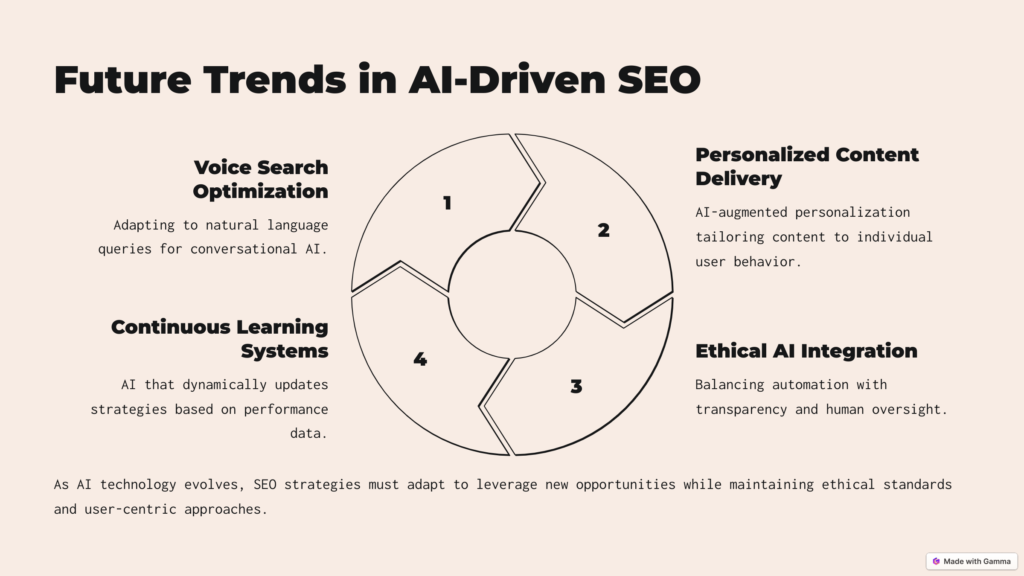
1 – Voice Search Optimization
Voice search has grown dramatically in recent years, with more users relying on voice assistants like Siri, Alexa, and Google Assistant for their daily tasks. This trend is only expected to continue, making voice search optimization a critical component of modern SEO strategies.
What It Means for SEO:
Natural Language Queries: Voice searches tend to be more conversational and longer than traditional text searches. For instance, instead of typing “best restaurants nearby,” a user might ask, “What are the best restaurants near me with outdoor seating?” AI optimization can help tailor content to better align with these natural, spoken phrases.
Featured Snippets and Direct Answers: AI is excellent at analyzing and understanding the structure of voice search queries. SEO strategies will increasingly need to focus on providing clear, concise answers that can be easily read out loud by voice assistants.
Why It Matters:
Voice search is becoming an integral part of how people interact with search engines, and SEO strategies must adapt to ensure visibility in voice results. Optimizing for voice search can help businesses capture a growing segment of search traffic.
2 – Personalized Content Delivery
As AI and machine learning continue to advance, personalized content delivery will become more refined. AI systems will learn more about individual user behaviors, preferences, and past interactions to provide tailored content that meets their specific needs.
What It Means for SEO:
User-Centric Content: Content will be dynamically tailored based on a user’s search history, location, device, and even previous interactions. For example, someone who frequently searches for vegan recipes will see more relevant content related to plant-based diets, cooking tips, and restaurant recommendations.
Hyper-Personalized Experiences: AI-driven platforms will help create individualized content experiences, optimizing landing pages, offers, and even product recommendations based on users’ unique behaviors.
Why It Matters:
Personalization is key to boosting engagement and conversions. Users are more likely to stay on websites and return if the content is relevant and tailored to their needs. SEO strategies that focus on personalized experiences will be better positioned to drive higher traffic and customer satisfaction.
3 – Ethical AI Integration
As AI plays a larger role in SEO and content generation, it’s important to ensure that automation is balanced with ethical standards. This includes maintaining transparency, fairness, and human oversight when implementing AI strategies.
What It Means for SEO:
Transparency and Trust: Users and search engines alike will value content that is clearly marked as AI-generated, with proper disclosures. This transparency builds trust, ensuring that users know they are getting reliable and honest information.
Avoiding Bias: AI systems must be carefully monitored to avoid biases in content recommendations. Ethical AI practices will involve constant updates to algorithms to ensure fairness and accuracy in content delivery.
Human Oversight: While AI can automate many tasks, human oversight will remain essential to ensure that content meets high standards of quality, relevance, and ethical guidelines.
Why It Matters:
Integrating ethical practices in AI-driven SEO is not just a matter of compliance—it’s about maintaining trust with your audience. As AI continues to evolve, businesses that prioritize ethical AI integration will stand out in a crowded marketplace, appealing to both consumers and search engines that value transparency.
4. Continuous Learning Systems
The future of SEO isn’t static, and neither is AI. AI systems will continue to evolve and adapt based on performance data. Continuous learning systems allow AI to dynamically update SEO strategies in real-time, adjusting to changing search engine algorithms, user behavior, and emerging trends.
What It Means for SEO:
Adapting to Algorithm Changes: As search engines like Google update their algorithms, AI-powered SEO tools will be able to make instant adjustments to keep content optimized for new ranking factors.
Performance-Based Adjustments: AI systems will continually assess how content performs, making adjustments based on user interactions, engagement, and even the seasonality of certain topics.
Proactive SEO: AI will shift from a reactive strategy to a more proactive one, identifying opportunities to optimize content before a trend or algorithm change even occurs.
Why It Matters:
In a constantly changing digital environment, AI’s ability to learn and adapt in real-time is a game-changer. Continuous learning systems will help businesses stay ahead of the competition by automatically refining strategies to match evolving trends and algorithm updates.
TL’DR: Ranking on ChatGPT – FAQ
Q1: How does ChatGPT determine website rankings?
ChatGPT doesn’t rank websites in the traditional sense.
Instead, it uses its vast knowledge base, trained on massive text data, to identify authoritative and relevant websites based on user prompts. When you ask ChatGPT for recommendations, it draws insights from its training data rather than live search results.
Q2: If my website ranks high on Google, will it automatically rank well on ChatGPT?
Not necessarily.
While a good Google ranking signifies strong SEO and online authority, ChatGPT relies on its internal knowledge base, which may not perfectly mirror real-time search engine rankings. A high Google ranking is a positive indicator, but it doesn’t guarantee a top spot in ChatGPT’s recommendations.
Q3: Can I directly influence my website’s ranking in ChatGPT’s responses?
No, you cannot directly manipulate ChatGPT’s rankings.
Its responses are generated from its training data, which is updated periodically. Focusing on building a strong online presence, providing high-quality content, and establishing industry authority will contribute to a better overall digital footprint, which may be reflected in future training data.
Q4: What strategies can I implement to improve my website’s chances of being recommended by ChatGPT?
- Deliver Exceptional Service: Client satisfaction and tangible results are paramount.
- Strong Online Presence: Maintain a user-friendly website with valuable content, and engage actively on social media.
- Reviews & Testimonials: Encourage clients to leave positive reviews on relevant platforms.
- SEO Optimization: Improve your website’s visibility in search engines for relevant keywords.
- Networking: Build relationships within the industry by attending events and engaging in communities.
- Industry Listings: Submit your agency to reputable directories and rankings.
- Continuous Learning: Stay abreast of the latest trends and technologies in digital marketing.
- Ethical Practices: Maintain transparency and integrity in all your dealings.
- Showcase Success: Build a portfolio highlighting successful campaigns and their impact.
- Awards & Recognition: Seek industry awards to demonstrate excellence.
- Performance Analysis: Utilize analytics to track and optimize your campaigns.
- Public Relations: Employ a strategic PR approach to boost visibility and reputation.
Q5: What practices should I avoid to prevent negatively affecting my potential ranking on ChatGPT?
- Unethical Practices: Steer clear of black-hat SEO or any deceptive marketing tactics.
- Neglecting Customer Satisfaction: Prioritize client happiness and address concerns promptly.
- Ignoring Online Reputation: Actively manage your online reviews and feedback.
- Lack of Transparency: Be open about your services and pricing to build trust.
- Failing to Adapt: Stay current with industry changes and evolving best practices.
- Inconsistent Branding: Maintain a consistent brand image across all platforms.
- Low-Quality Content: Provide valuable and engaging content to attract and retain audience interest.
- Overpromising: Set realistic expectations to avoid disappointing clients.
- Ignoring Analytics: Utilize data to track performance and inform strategic decisions.
- Neglecting Networking: Engage with industry peers to build connections and share insights.
- Underestimating Competition: Analyze competitors to refine your strategies.
- Unclear Value Proposition: Clearly articulate the unique benefits you offer.
- Non-Compliance: Adhere to all legal and regulatory requirements.
Q6: Does ChatGPT use real-time browsing or search engine data?
No.
ChatGPT relies on the data it was trained on, which includes a snapshot of the internet up to a specific point in time. It doesn’t browse the web in real-time or factor in live search engine results.
Q7: Can I pay to improve my ranking in ChatGPT’s responses?
No.
Paid advertising or promotional activities do not influence ChatGPT’s rankings. Its responses are determined by the information present in its training data, not external marketing efforts.
Q8: How does ChatGPT assess the authority and credibility of websites?
ChatGPT analyzes the information in its training dataset to determine website authority. Factors include:
- References in Authoritative Sources: Being cited by reputable publications or websites lends credibility.
- Mentions in Reputable Publications: Features or mentions in trustworthy media outlets contribute to authority.
- Content Quality: Well-researched, informative, and engaging content strengthens perceived expertise.
Q9: Are traditional SEO practices still relevant in the age of AI and are zero-click searches impacting SEO?
Yes, traditional SEO practices are still very relevant, but they need to adapt.
While AI-driven search experiences, such as AI overviews and zero-click results on search engine results pages (SERPs), provide answers directly, organic traffic remains crucial.
Focus on creating high-quality content that aligns with search intent and user experience is still vital. Search engine algorithms still rely on factors like E-E-A-T (Expertise, Experience, Authoritativeness, and Trustworthiness), backlinks from reputable sites, content freshness, and user engagement metrics (time on page, low bounce rate), and overall user experience. In short, SEO is evolving into “search everywhere optimization,” encompassing not just search engines but also other platforms such as social media, AI engines, and marketplaces.
Q10: Is it still essential to consider keyword research and on-page SEO when creating content, given the growth of AI and voice search?
Yes, keyword research and on-page SEO remain essential, even with the growth of AI and voice search.
While AI is changing how users search for information, it still relies on indexing and understanding the intent behind search terms. Focus on creating content that fulfills the user’s search intent and is optimized for both traditional and conversational keywords. In addition, focus on optimizing for user experience.
This involves ensuring your content is easily found, understood, and provides valuable information. Remember to create content that provides clear and concise answers to common questions, making it discoverable for both AI and voice search. Also keep in mind that voice search often uses more conversational keywords.
The Ultimate Perspective
ChatGPT isn’t just another platform—it represents a fundamental shift in how businesses are discovered, evaluated, and trusted.
This isn’t about gaming an algorithm. It’s about genuine value, clear communication, and solving real-world problems.
The AI revolution isn’t coming. It’s here.
Are you ready to lead, or will you be left behind?
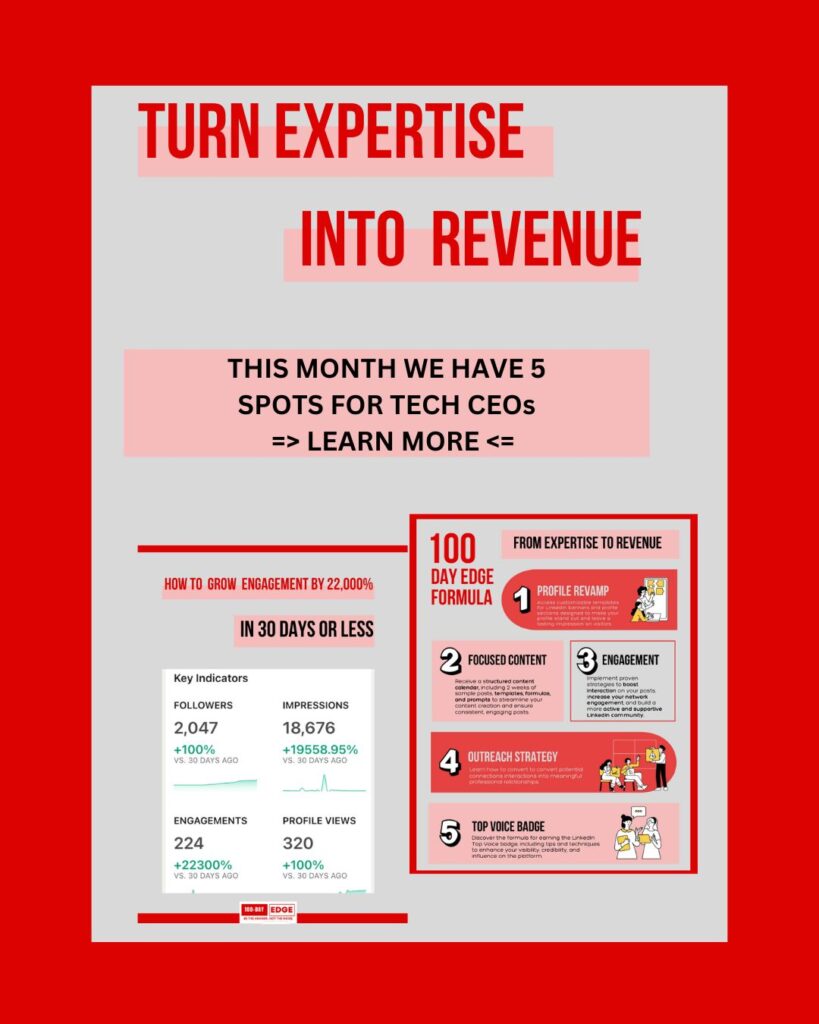
This month, my team is helping 5 technology leaders transform their expertise into tangible business results.
In 100 days, you’ll:
- Stage 1: Define your EDGE and optimize your online presence.
- Stage 2: Engage your tribe and land your first high-value client.
- Stage 3: Set your EDGE on fire with strategic content and recurring revenue.



